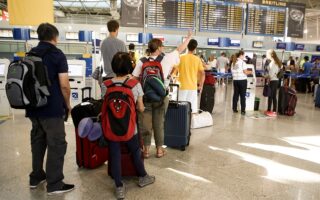Greek tourism leaders address sustainability and investment challenges

CEOs from Greece’s leading tourism businesses gathered at the “Reimagine Tourism in Greece” conference on Tuesday, where they discussed the industry’s challenges and the urgent need for sustainable practices to ensure the long-term success of Greek tourism.
The event, held at Aegean Airlines’ new “green” hangar at Athens International Airport, was moderated by Kathimerini journalist Ilias Bellos.
“Tourism has pushed Greece forward over the last 12 years,” said Aegean Airlines Chairman Eftichios Vassilakis, adding that the biggest challenge is how the tourism industry can continue to develop while ensuring sustainability.
“To sustain progress, we must find a balance between development, employment, and our environmental footprint,” he said.
Attica Group CEO Panagiotis Dikaios emphasized the critical role of Greek coastal shipping in connecting mainland Greece to the islands, contributing €11.8 billion to the economy, or 5.4% of Greece’s GDP. He identified the need to renew the aging coastal fleet and comply with the framework for decarbonizing shipping as significant challenges.
“Renewing the country’s coastal fleet will require around €3 billion in the coming years,” said Dikaios, noting that this process will take time.
Fraport Greece CEO Alexander Zinell said that his company, which operates 14 regional airports in Greece, is ten years ahead of its original projections for tourist traffic.
However, he emphasized that the real challenge now lies in further developing the necessary infrastructure. He pointed out that, in addition to financial resources, there is a critical need for skilled personnel across various fields.

Piraeus Bank CEO Christos Megalou highlighted a further challenge. “Despite all the efforts made, there remains a significant investment gap,” he said. He explained that investments account for only 14% of the country’s GDP, while the EU average ranges from 22% to 24%.
“To bridge this investment gap, we need approximately €370 billion over the next ten years,” he said, underscoring that infrastructure investments are crucial for the long-term success of the tourism sector.
Currently, tourism constitutes 14% of Greece’s GDP, amounting to around €35 billion, with 15% of Piraeus Bank’s portfolio focused on tourism investments.
Marios Psaltis, managing partner of PwC Greece, noted that while tourism played a major role in the recovery of Greece’s economy after the ten-year debt crisis and the Covid-19 pandemic, the lack of a strategic tourism plan, coupled with an increasing number of visitors, has led to several challenges. He identified infrastructure and workforce development as the most pressing issues.
“By addressing these challenges, I believe we will uncover the opportunities available to us as a country to move forward,” he said.
Organized by Kathimerini and its partners, the “Reimagine Tourism in Greece” annual conference aims to promote sustainable tourism by bringing together leading thinkers, political and business leaders, and influential figures from the hospitality industry.





